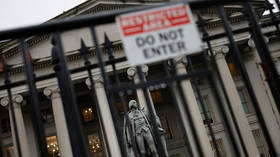Indian banks fear US sanctions – Russian ambassador
Washington has been scrutinizing trade transactions between Moscow and New Delhi, according to Denis Alipov
Indian banks have been cautious about settling transactions with Russian clients due to the risk of facing secondary US sanctions, Moscow’s envoy to New Delhi has said.
Speaking to reporters on Monday, Denis Alipov said that Washington has been meticulous in tracking trade transactions between Russia and India.
Indian banks with exposure to the US are “concerned about secondary US sanctions,” Alipov stated, as quoted by Bloomberg.
In June, Washington expanded its list of entities covered by secondary sanctions to include major Russian lenders. The Treasury Department announced that foreign banks that continue to transact with them could be barred from the wider US financial system.
According to Alipov, Moscow and New Delhi have been working to establish a direct trade payment system in rubles and rupees. Senior ministers of the two countries are scheduled to meet in November to discuss ways to boost bilateral trade.
“We are hopeful that understanding among various banking communities in India would grow, recognizing it is safe and correct to work with various countries without fearing coercive measures from the US,” Alipov was quoted as saying by the Business Standard.
The Russian ambassador stressed it is important for BRICS countries and other world nations to have “an equal say” in global financial matters. He also underlined BRICS’ role as a “voice of the Global South and developing world in international affairs.”
New Delhi became one of Moscow’s biggest trade partners after Russian business turned to Asian markets following the imposition of sweeping Western sanctions over the Ukraine conflict. India has not supported the sanctions despite pressure from the West, and has ramped up its purchases of Russian oil, recently overtaking China as Moscow’s largest buyer.
In 2023, trade turnover between Russia and India surpassed $65 billion, compared to average figures of $10-13 billion reported annually before 2022. In July, the leaders of the two countries set a goal of reaching $100 billion in mutual trade by 2030.






Comments are closed.